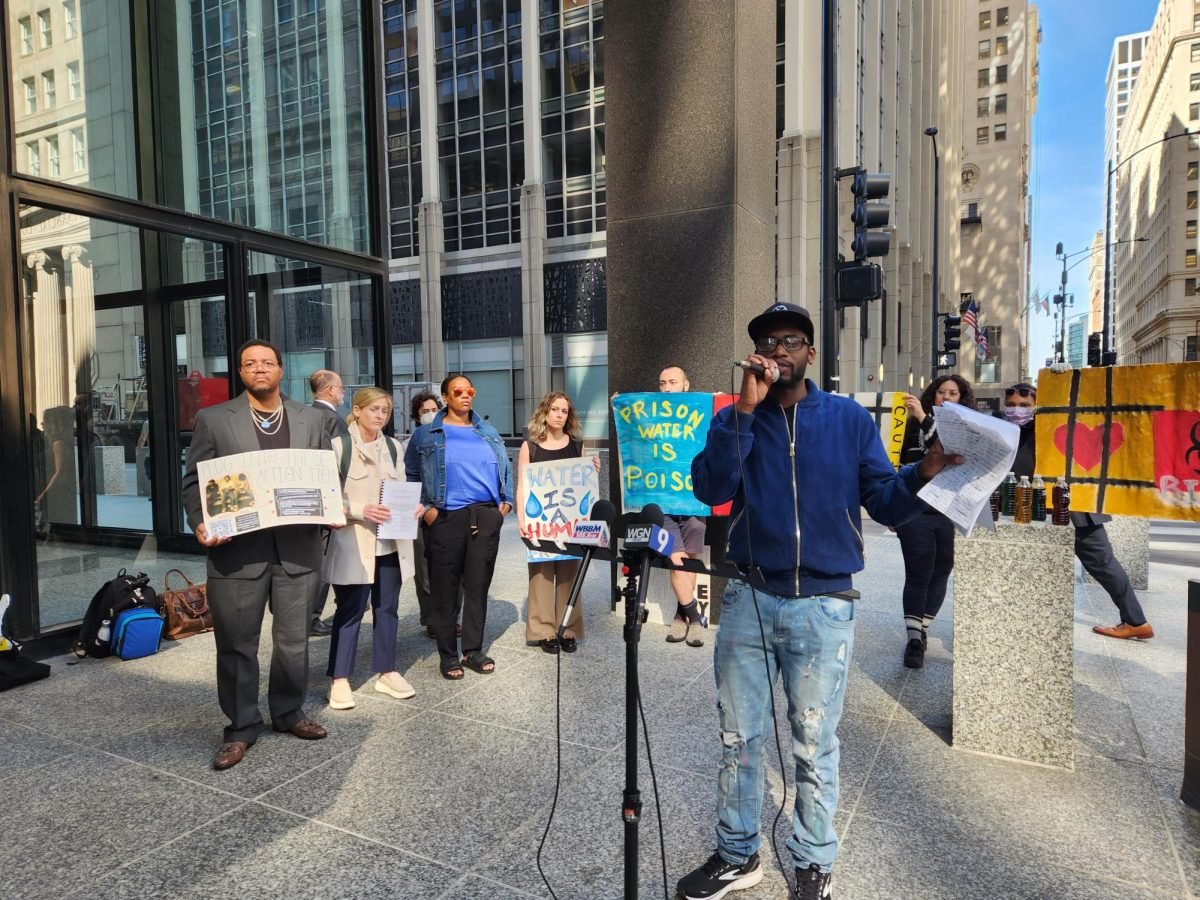Fifteen environmental and prison reform groups filed an emergency petition asking the U.S. Environmental Protection Agency to address dangerous water quality in Illinois prisons, organizers announced at a Monday press conference in downtown Chicago.
The petition asks that the EPA order Illinois to develop an emergency plan for protecting public health at state correctional facilities using the Safe Drinking Water Act. That plan could include providing free bottled water to incarcerated people and releasing them from prisons under available legal means.
It also asks the EPA to create a binding order that would require the state to address prison water sanitation and infrastructure long-term.
Repeated failure of the Illinois Department of Corrections and Illinois Environmental Protection Agency to provide clean water, properly inspect correctional facilities and respond to complaints within prisons made Monday’s action necessary, advocates said at the press conference. The conference included representatives from the Coalition to Decarcerate Illinois and Uptown People’s Law Center.
“They can’t provide water, which is essential for life,” said artist and activist Brian Harrington, who was formerly incarcerated. “Essentially, when you get sentenced to IDOC you’re sentenced to die.”
Some incarcerated people at Illinois prisons have reported elevated blood lead levels after release, and some facilities have documented histories of high lead concentrations in their water, according to the petition.
Incarcerated people have also reported experiencing rashes and vomiting from drinking or making contact with prison water, which has also been reported to contain Legionella bacteria.
Harrington, who also goes by King Moosa, said he had to drink and use unsanitary and unsafe water for more than a decade.
“I remember being thirsty, but can’t drink the water because it smelled like sewer gas,” Harrington said.
He also said a person currently incarcerated told him there were “black specks” in the water.
In addition to immediate clean water relief for incarcerated people, Harrington called for the government to invest in communities of color to keep people out of prisons in the first place.
Northwestern Prison Education Program graduate James Soto, who was wrongfully convicted and incarcerated for 42 years, said he faced similar experiences at Stateville Correctional Center. He was released in December and said recent medical tests revealed elevated lead levels in his bloodstream.
“If I’m suffering from these symptoms, who else in IDOC and Stateville … and Logan (Correctional Center) are suffering from the same things?” he said.
Soto added that there needs to be toxin testing for incarcerated people.
Activist Cassandra Greer-Lee’s husband, Nickolas Lee, died from COVID-19 while in custody, she said. He was being held in a Cook County jail — prior to a trial or a court finding him guilty — she added.
Greer-Lee said she only found out about her husband’s death when the hospital called, and she doesn’t want the dehumanization of incarcerated people and their families to continue.
“I don’t want another family to endure what I had to endure,” she said.
Three to four times a year, Greer-Lee travels to Illinois prisons to donate clean bottled water.
She said that’s not enough. It’s elected officials’ responsibility to take charge of this emergency, she said. Hopefully, Gov. J.B. Pritzker and other Illinois officials will recognize the urgency of this situation and act, Greer-Lee added.
The EPA can correct issues that Illinois agencies have left unaddressed, Pritzker Prof. Robert Weinstock said. Weinstock — director at the Pritzker School of Law’s Environmental Advocacy Center — delivered the petition to EPA officials at the Ralph H. Metcalfe Federal Building just before the press conference, he said.
While federal law does not require the EPA to address issues in the petition within a set timeline, Weinstock said the agency is required to respond “as quickly as EPA deems necessary.”
That means acting tomorrow, he said.
Weinstock said he’s not aware of the EPA ever having used its SWDA emergency powers in a correctional facility. Still, similar interventions from the agency have previously helped address water quality issues in places like Flint, Michigan.
“I am confident that the agencies in power have the power to make these changes,” Weinstock told The Daily. “I am hopeful that they will use that power.”
Email: [email protected]
Related Stories:
— City to conduct water main improvement on Crain Street
— Northwestern Prison Education Program celebrates inaugural commencement
— City Council discusses lead pipe replacement, proposed water rate increase














